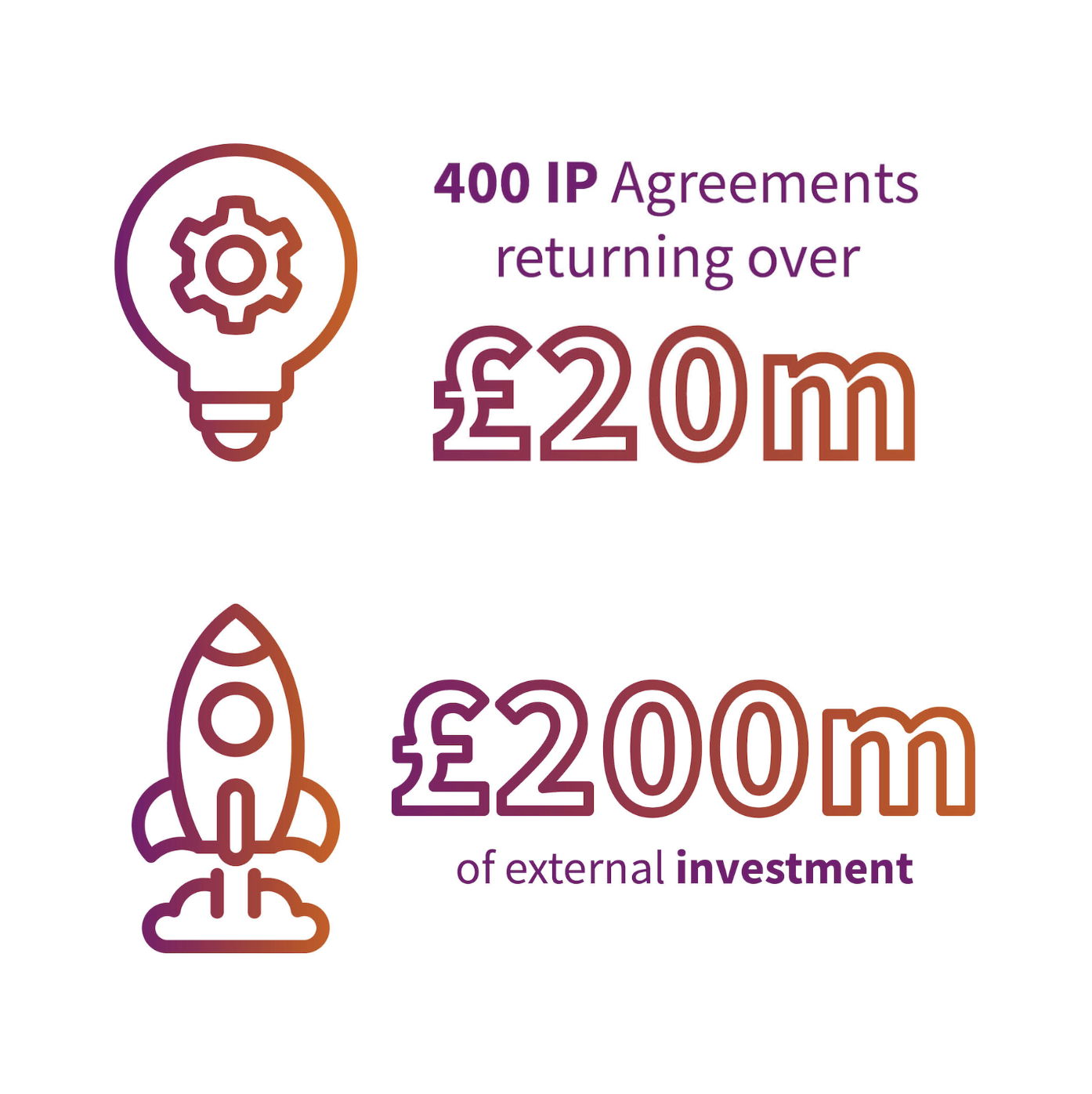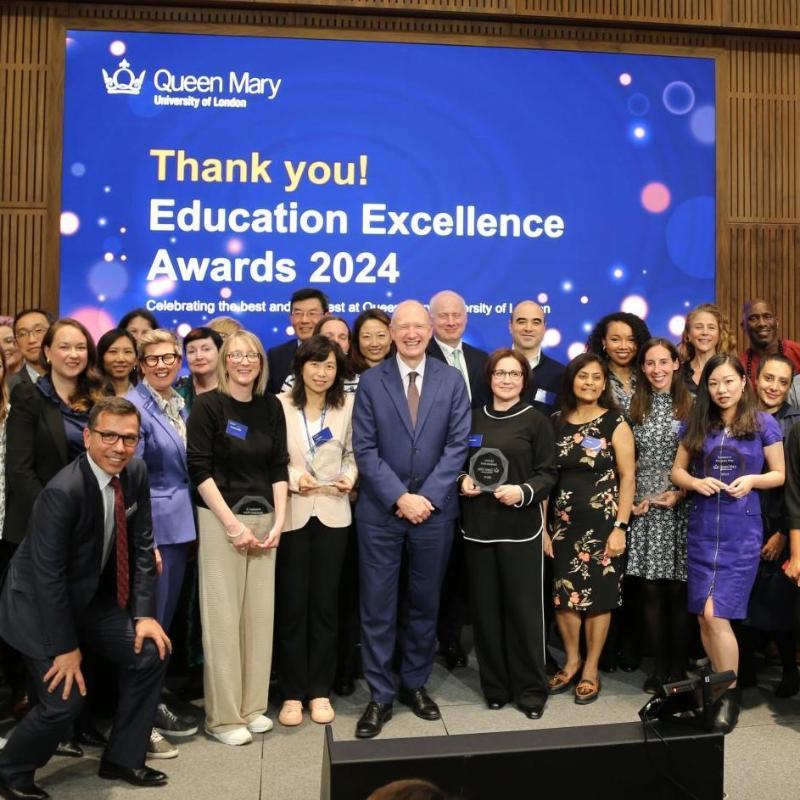So much has been achieved since the launch of our University Strategy in 2019. At the halfway point in 2024, we reflect on our progress and look ahead to our priorities over the next five years.
We have cemented our unique position combining excellence in research, innovation and education with an unrivalled commitment to social mobility and justice, coupled with our sustained and deep engagement with our local, national and global communities.
Queen Mary is unparalleled: no other university in the world has excellence across these four pillars of research, education, engagement and inclusion.
The launch of Strategy 2030 took place at the V&A in 2019. This bold strategy was designed to build on the University's strengths and ensure we could cement our unique position combining excellence in research, innovation and education with an unrivalled commitment to social mobility and justice, coupled with our sustained and deep engagement with our local, national and global communities.
The last five years has seen a significant increase in our power and presence.
Our turnover has risen from £420 million to in excess of £720 million, and in one year (2021/22) we delivered a total economic impact of £4.4 billion to the UK economy. We are very efficient: for every £1 spent we generate £7 for the UK economy, which is significantly higher than the Russell Group average.
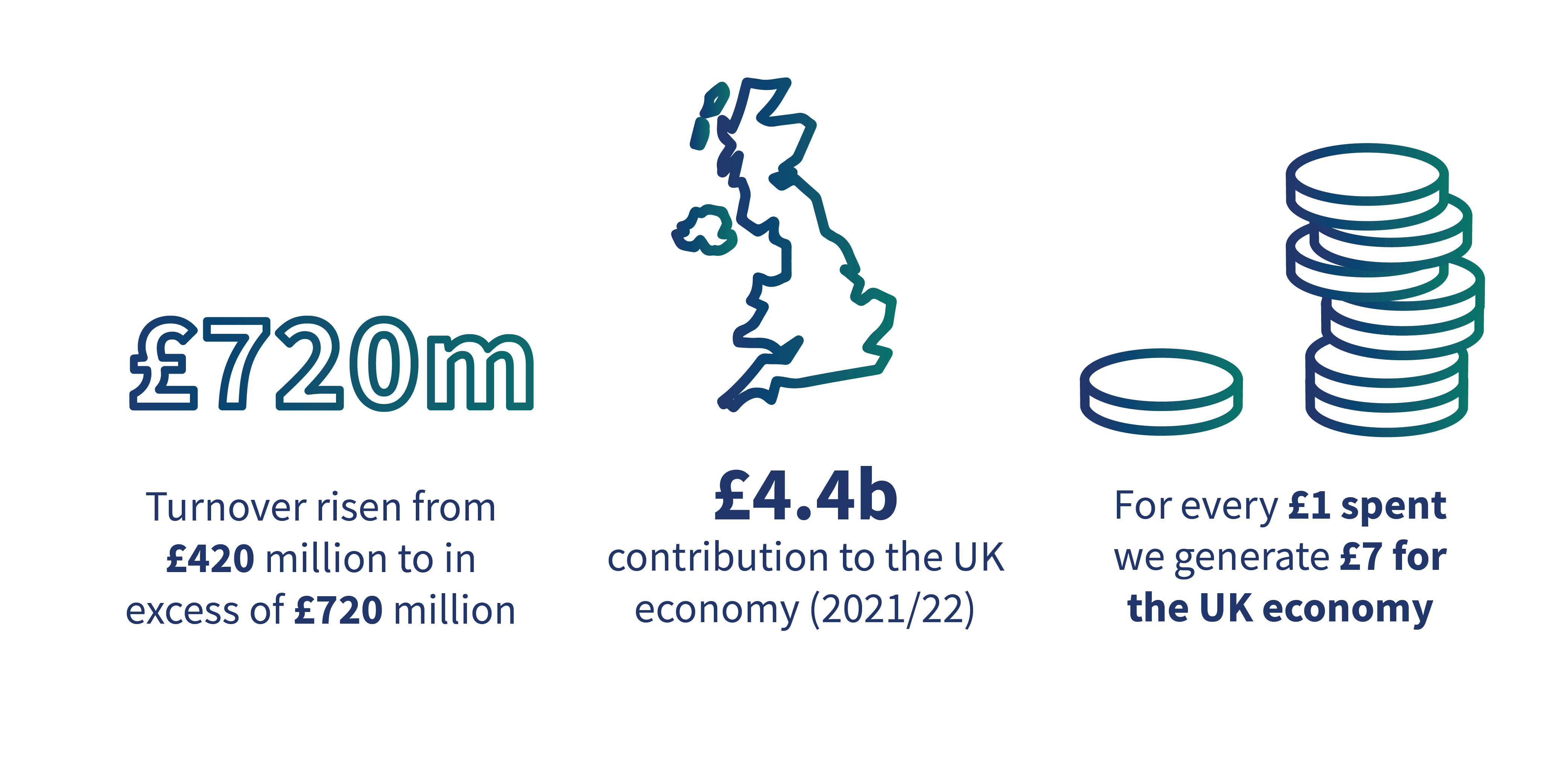
The number of students on our campuses has increased from 20,000 in 2017 to 33,000 in 2024, and the number of staff has also risen from just over 5,465 to over 6,000. Our footprint has increased in London and across the world: we now have nine locations in London, and over 5,500 students studying overseas including through a transnational education partnership in China. Our community of engaged alumni has also significantly increased with the launch of nine global chapters.
As we look forward to the next six years, it is timely to review whether our University Strategy is still relevant in the world we live in today. We believe the answer to that question is a resounding yes: our focus on excellence in research and education, coupled with our commitment to engagement and social mobility, and our values-led approach is as apposite now as it was then.
With the inequality gap widening at an alarming pace across the world, Queen Mary’s moment is now.
With the inequality gap widening at an alarming pace across the world (World Economic Forum’s Future of Growth Report 2024), Queen Mary’s moment is now: our Vision, Mission and Strategy have always been focused on opening the doors of opportunity and working, with our key stakeholders, towards a more equitable future.
Now, more than ever, our work is critically important. We are not therefore looking to change our direction. Instead, we continue to support our communities to succeed and achieve this vision, and ensure Queen Mary is recognised as the global leader for tackling embedded inequalities and transforming lives.
Excellence in research and innovation
In 2024, Queen Mary was ranked 14th in the world and 5th in the UK for the quality of our research (THE World University Ranking 2024). In the most recent Research Excellence Framework (REF), we were ranked joint 7th in the UK for the quality of our research with 92 per cent of Queen Mary’s research assessed as world-leading or internationally excellent. We have attracted significant competitive research funding, with our research income increasing by 42 per cent, and we currently have nine Nobel Laureates amongst our former staff and students.
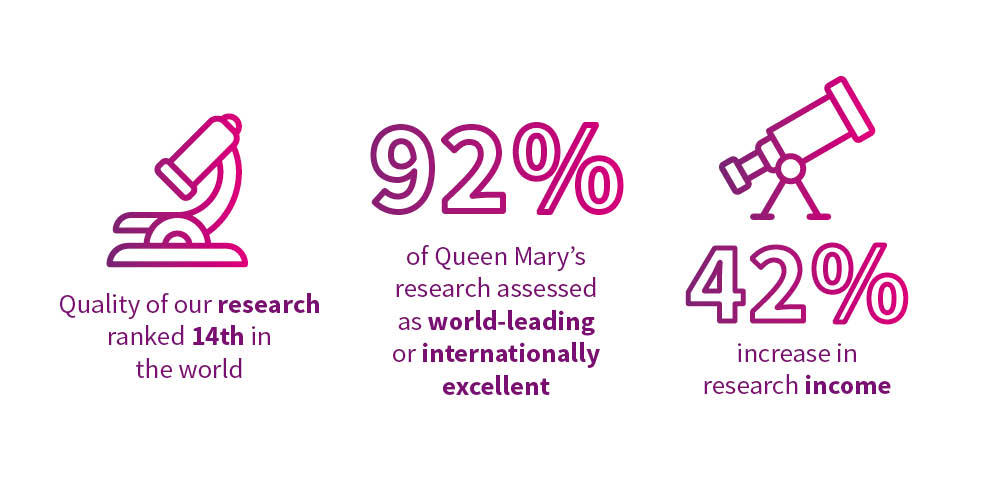
The impact of our research and innovation is felt across the globe. For example, our academics’ work on the prevention and treatment of cancer has saved, and will continue to save, thousands of lives. Our leading work on the eradication of Hepatitis C has already seen a reduction in death rate of 20 per cent, and a 95 per cent increase in curing patients of the virus. Queen Mary's Genes and Health research programme, a major academic-industry consortium involving over 250 researchers working in partnership with Queen Mary’s local communities, is leading to better health outcomes for British Bangladeshi and Pakistani people.
The 100,000 Genomes Project accelerates analysis into complex conditions, providing much-needed data that will allow far better clinical interpretation of the genetic code. Our researchers have sequenced 100,000 genomes from around 85,000 patients affected by rare disorders and cancers, and brought life-changing results to NHS England patients as a result.
The implementation of the London Ultra Low Emission Zone, underpinned by research from Queen Mary, is improving air quality for thousands of inner-city children, and our research on plastics recycling is enabling policy change that will lead to significant health and environmental benefits. Bringing a spotlight on accent bias and its impact on success at job interviews will pave the way for more inclusive recruitment practices, whilst better understanding food security in Africa will help alleviate food poverty. These are just some examples of the outstanding research our academics have achieved: for more information, visit our research pages.
Professors Brown and Datta of the Queen Mary School of Geography have been carrying out research in Zimbabwe, where a staggering 60 per cent of the population doesn’t have secure access to food, to better understand severe acute malnutrition in children under the age of five. They hope this work will help influence policy and give a greater understanding of the complexities of food security as a concept, with the ultimate goal to help find solutions to reverse this epidemic of malnutrition and hunger.
At Queen Mary, we have a passion for partnership working and supporting innovation. Outcomes of the Knowledge Exchange Framework repeatedly place us in the highest possible category within the Russell Group for Research Partnerships, Public and Community Engagement, and IP and Commercialisation, which underlines our leadership across these areas.
Our leadership in public engagement is well-known: in 2021, we were the first university to receive the platinum watermark in public engagement. Leading examples of our work include our award-winning Legal Advice Centre, and the Centre of the Cell (see below). Our public engagement is global as well as local – it is through collaborations with global communities, governments and nongovernmental organisations (NGOs) that our research translates into impact across the globe.
Behind all this great work are our people: our community of academics, students, and professional services staff who work together to undertake research and turn it into meaningful outcomes for society. To enable this success, we have invested significantly in people and in our infrastructure. Over 900 strategic hires have joined our academic community, and we have invested circa £340 million in digital and physical infrastructure for research and innovation.
In research and innovation, we continue down the path to success. We are very ambitious and are determined to cement our place as one of the great research-intensive universities in the world, properly recognised for our work. This means aiming for even better results in the next REF, with more subject areas claiming the top spot in their disciplines and seeing significant improvements in all the key metrics.
To enable this, over the next few years we will focus our efforts on supporting our brilliant researchers, including working to ensure our research culture is exemplary, attracting, nurturing and retaining the very best talent at all stages of the research career pathway, and investing in the support of impact, innovation and partnerships to maintain our leading position.
Excellence in education and student experience
We are so proud of our students’ achievements. We continue to attract students typically under-represented at universities like ours: 93 per cent of our UK students are from state schools, 72 per cent are from ethnic minority backgrounds, and 46 per cent are the first in their families to go into higher education. 36 per cent are from households where the annual taxable income is less than £35,000 and 24 per cent have accessed free school meals.
Queen Mary students go on to succeed in their chosen areas, which is why we were ranked number one in the UK for social mobility by the Institute of Fiscal Studies, working in partnership with the Sutton Trust and the Department for Education. Since 2020 we have consistently been in the top 20 universities targeted by leading employers.
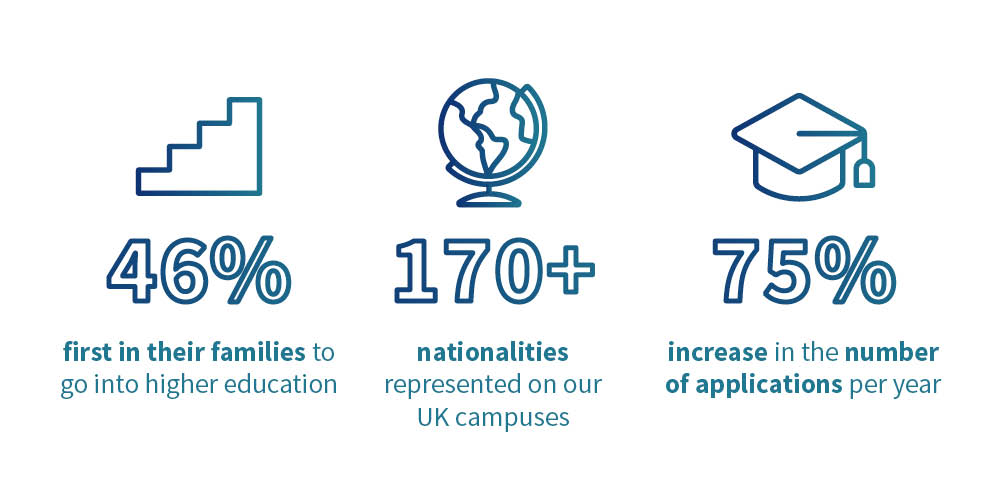
Queen Mary continues to prove that social inclusion and academic success are not mutually exclusive.— The Times & Sunday Times Good University Guide 2024
Queen Mary is an incredibly attractive study option for students from the UK and overseas; we now have an average of eight applications for every place, and have seen a 75 per cent increase in the number of applications we receive annually since 2017. We also continue to be one of the most attractive universities for study abroad students, with an increase of 51 per cent since 2017. We remain one of the most diverse universities in our international community, with over 170 nationalities represented amongst our staff and students on our UK campuses.
We are one of the most diverse universities in the world, with over 170 nationalities represented on our UK campuses. We have been ranked number one in the UK for social mobility and are very proud to have closed the attainment gap between students from ethnic minority backgrounds and white students.
We continue to invest in our students’ education and experience. We are very proud to have closed the attainment gap between students from ethnic minority backgrounds and white students, and to have seen improvements in the graduate outcomes of our students across the first part of the Strategy period. We have embedded graduate attributes in all our programmes, helping to make a Queen Mary graduate distinctive and stand out from the crowd. These attributes include employability skills and social responsibility, equipping our students to become active global citizens.
We have invested in the physical and digital infrastructure for our students, including an £18.6 million investment in our libraries, a state-of-the-art mathematics building, a fully accessible creative arts facility and renovated study and leisure facilities for our students at our Whitechapel campus. We continue to develop and deploy the latest technology to enhance our educational offer, and have won several awards for using Virtual and Assisted Reality in our teaching.
We continue to invest in our students' education and experience, including an £18.6 million investment in our libraries, a state-of-the-art mathematics building, a fully accessible creative arts facility and renovated study and leisure facilities.
We have also expanded the reach of our education. We were the first Russell Group university to offer degree apprenticeships, and now have over 500 students on those pathways. We have excellent partnerships in place to deliver apprenticeships, including with Deloitte, PwC and Goldman Sachs. In 2022, we opened the London City Institute of Technology, working in partnership with Newham College, through which we offer training across engineering, computer science and digital technologies. This expansion is felt globally, increasing our transnational education students from 4,000 to 5,500 and opening a new location in Hainan, China, as well as significantly increasing our education and research partnerships across the world.
We will accelerate embedding employability skills consistently in our curricula to ensure all our students are equipped to achieve their full potential in their careers. We are not satisfied with TEF Silver but are determined to achieve a Gold, and will work tirelessly to improve the consistency and standard of our students’ education and experience across all degree programmes.
Over the last five years of the Strategy, we have seen significant shifts in the global demand for education in the UK, alongside accelerating operating costs for universities driven by a period of very high inflation. As we look forward, it is imperative that we operate more effectively and efficiently, particularly in the delivery of education. The cost of delivery must not exceed the tuition fee received. In our work to minimise costs we must also preserve, and improve, our students’ experience.
Sustainability
We recognise the increasing impacts of climate change across the world, and are committed to supporting the UK Government’s overall ambition of reaching net zero. Our primary means of addressing sustainability goals is through our leading research, innovation and education of sustainable leaders. Sustainability is embedded in our curricula, and through our commitment and successes in recruiting and supporting students from diverse backgrounds, Queen Mary graduates are ideally placed to lead towards a more equitable and sustainable future. We also address sustainability through our research, be that on energy and food security, or tackling health or social inequalities across the globe. Additionally, we continue to mitigate the climate impacts of our operations.
Sustainability is already embedded in our vision, mission and operations. Through the next Strategy period, we will make our work towards the Sustainable Development Goals (SDGs) more visible, and support our community to work together, and with partners, to address these vital ambitions.
Queen Mary's multi-disciplinary research into plastic pollution has produced crucial new insights into how we measure its impact. The research demonstrated the urgent need to standardise methods of monitoring microplastics and their environmental impact, as well as important gaps in our understanding of pollution sources and the fate of microplastics in the environment.
Our people
Queen Mary is its people: our community of staff, students, alumni, partners and supporters. Our primary role is to enable our communities to succeed, as within our students, staff, alumni and partners is the talent and leadership needed to ensure we achieve our ambitions. We have invested heavily in our staff, students and alumni over the last five years and will continue to do so.
We have made strategic investments in all our faculties, attracting some of the very best academic talent from across the globe. We have also invested in professional services, attracting and nurturing outstanding talent across all areas. Overall numbers of staff across Queen Mary continue to increase. We have made investments in the learning and development of all our staff, and made progress against our staff engagement and equality metrics. Fostering our communities to enable them to achieve their potential and continue to open doors and transform lives remains our primary focus.
Looking to the future
So much has changed in the last five years. The UK higher education sector has been tested as never before by: a global pandemic; unprecedented levels of political change; industrial action; the cost of living crisis; fiscal challenges driven by the increasing costs of pensions; reducing numbers of international students; and the fee limit for domestic undergraduate students remaining frozen. At Queen Mary, we have managed the financial challenges well and remain resilient and able to drive forward our strategic aims. However, to ensure long-term resilience and financial viability we must continue to increase effectiveness and efficiency across all our activities.
Queen Mary’s Mission and Vision is entirely apposite and Strategy 2030 continues to provide the right framework for us to work within.
The economic and political turmoil across the world is resulting in increasing equality gaps in the UK and overseas. In this context, Queen Mary’s Mission and Vision is entirely apposite and Strategy 2030 continues to provide the right framework for us to work within. There are challenges to be faced, and we must, as described above, deliver our education more efficiently and effectively, whilst maintaining and enhancing our student experience. We must also look for further efficiencies in our operations.
We look forward to the next period in the knowledge that, in supporting our communities to succeed, we will achieve our goals. Our steadfast focus on excellence in research, innovation and education, coupled with our commitment to social mobility and engagement, is unique, relevant, and positions us to succeed.
So much has changed in the past five years and we face a range of challenges, including within the higher education sector. In this context, Strategy 2030 continues to provide the right framework for us to work within, and our steadfast focus on excellence in research, innovation and education, coupled with our commitment to social mobility and engagement, is unique, relevant, and positions us to succeed.
Note: unless otherwise stated, the time period is 2017 - 2024, as strategy development started in 2017.
